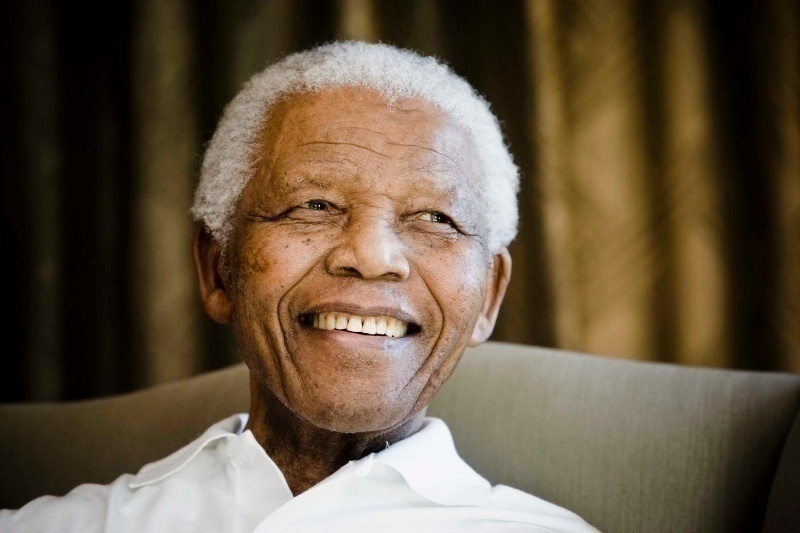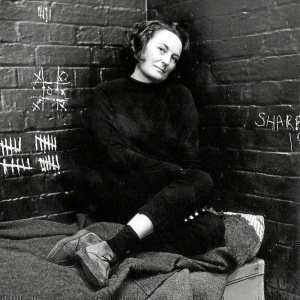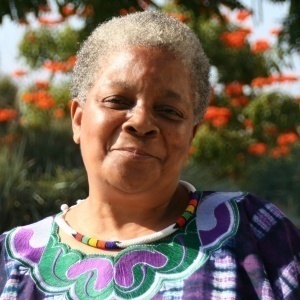Rolihlahla Mandela was born into the Madiba clan in Mvezo, on July 18, 1918. His father, principal counsellor to the Acting King of the Thembu people, died when he was a child and the young Rolihlahla became a royal ward. Hearing the elder’s stories of his ancestor’s valour during the wars of resistance, he dreamed also of making his own contribution to the freedom struggle of his people. He attended primary school in Qunu where his teacher Miss Mdingane gave him the name Nelson, in accordance with the custom to give all school children “Christian” names. Nelson Mandela began his studies for a Bachelor of Arts Degree at the University College of Fort Hare but did not complete the degree there as he was expelled for joining in a student protest. He completed his BA through the University of South Africa and went back to Fort Hare for his graduation in 1943.
On his return to the Great Place the King was furious and sent him away. He went to work in Johannesburg where he met Walter Sisulu, and Lazar Sidelsky. He would complete his education only in 1989, from jail. Nelson Mandela joined the African National Congress in 1944 when he helped formed the ANC Youth League. In 1944 he married Walter Sisulu’s cousin Evelyn Mase. Nelson Mandela rose through the ranks of the ANCYL and through its work the ANC adopted in 1949 a more radical mass-based policy, the Programme of Action. He was arrested many times for organizing strikes and protests against apartheid. In the meanwhile a two-year diploma in law on top of his BA allowed Nelson Mandela to practice law and in August 1952 he and Oliver Tambo established South Africa’s first black law firm, Mandela and Tambo. At the end of 1952 he was banned for the first time. As a restricted person he was only able to secretly watch as the Freedom Charter was adopted at Kliptown on 26 June 1955.
Nelson Mandela was arrested in a countrywide police swoop of 156 activists on 5 December 1955, which led to the 1956 Treason Trial. Men and women of all races found themselves in the dock in the marathon trial that only ended when the last 28 accused, including Mr. Mandela were acquitted on 29 March 1961. On 21 March 1960 police killed 69 unarmed people in a protest at Sharpeville against the pass laws. This led to the country’s first state of emergency on 31 March and the banning of the ANC and the Pan Africanist Congress on 8 April. Nelson Mandela and his colleagues in the Treason Trial were among the thousands detained during the state of emergency. During the trial on 14 June 1958 Nelson Mandela, who had divorced from Evelyne, married a social worker Winnie Madikizela. As soon as he and his colleagues were acquitted in the Treason Trial Nelson Mandela went underground and began planning a national strike for 29, 30 and 31 March. In the face of a massive mobilization of state security the strike was called off early. In June 1961 he was asked to lead the armed struggle and helped to establish Umkhonto weSizwe (Spear of the Nation).
On 11 January 1962 using the adopted name David Motsamayi, Nelson Mandela left South Africa secretly. He travelled around Africa and visited England to gain support for the armed struggle. He received military training in Morocco and Ethiopia and returned to South Africa in July 1962. He was arrested in a police roadblock outside Howick on 5 August while returning from KwaZulu-Natal where he briefed ANC President Chief Albert Luthuli about his trip. He was charged with leaving the country illegally and inciting workers to strike. He was convicted and sentenced to five years imprisonment which he began serving in Pretoria Local Prison. On 27 May 1963 he was transferred to Robben Island and returned to Pretoria on 12 June. Within a month police raided a secret hide-out in Rivonia used by ANC and Communist Party activists and several of his comrades were arrested.
In October 1963 Nelson Mandela joined nine others on trial for sabotage in what became known as the Rivonia Trial. Facing the death penalty his words to the court at the end of his famous ‘Speech from the Dock’ on 20 April 1964 became immortalized: “I have fought against white domination, and I have fought against black domination. I have cherished the ideal of a democratic and free society in which all persons live together in harmony and with equal opportunities. It is an ideal which I hope to live for and to achieve. But if needs be, it is an ideal for which I am prepared to die.”
On 11 June 1964 Nelson Mandela and seven other accused Walter Sisulu, Ahmed Kathrada, Govan Mbeki, Raymond Mhlaba, Denis Goldberg, Elias Motsoaledi and Andrew Mlangeni were convicted and the next day were sentenced to life imprisonment. Denis Goldberg was sent to Pretoria Prison because he was white while the others went to Robben Island. In jail he endured torture and illnesses. He was released from its gates on Sunday 11 February 1990, nine days after the unbanning of the ANC and the PAC and nearly four months after the release of the remaining Rivonia comrades. Throughout his imprisonment he had rejected at least three conditional offers of release. Nelson Mandela immersed himself into official talks to end white minority rule and in 1991 was elected ANC President to replace his ailing friend Oliver Tambo. In 1993 he and President FW de Klerk jointly won the Nobel Peace Prize and on 27 April 1994 he voted for the first time in his life. On 10 May 1994 he was inaugurated South Africa’s first democratically elected President. On his 80th birthday in 1998 he married Graça Machel, his third wife. True to his promise Nelson Mandela stepped down in 1999 after one term as President.
Nelson Mandela never wavered in his devotion to democracy, equality and learning. Despite terrible provocation, he never answered racism with racism. His life has been an inspiration to all who are oppressed and deprived, to all who are opposed to oppression and deprivation.





